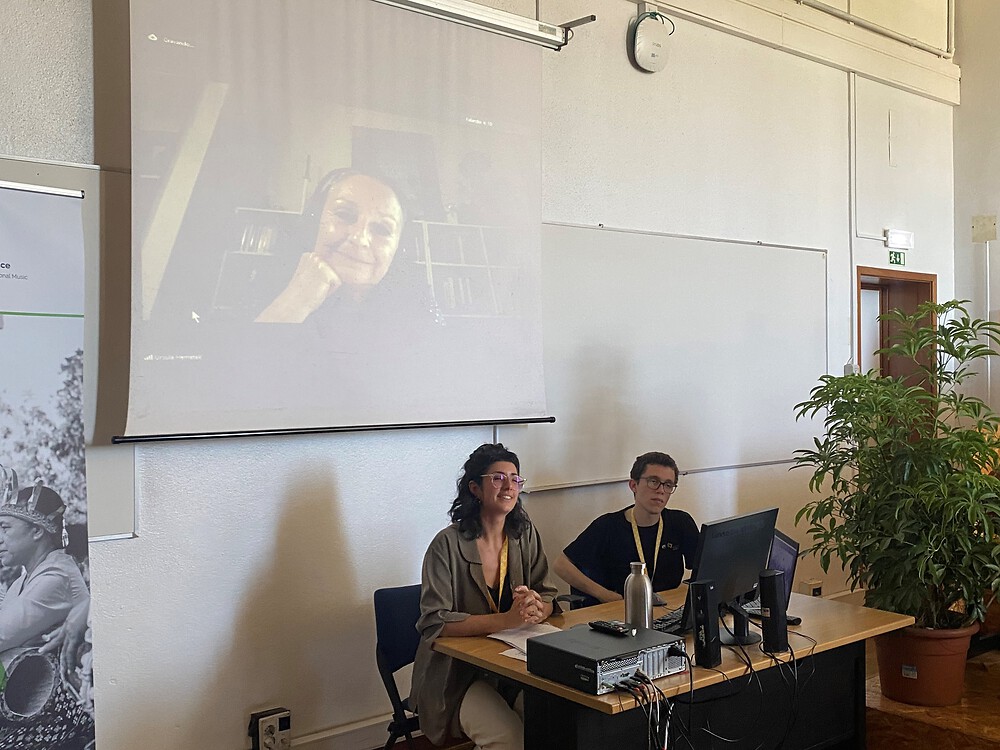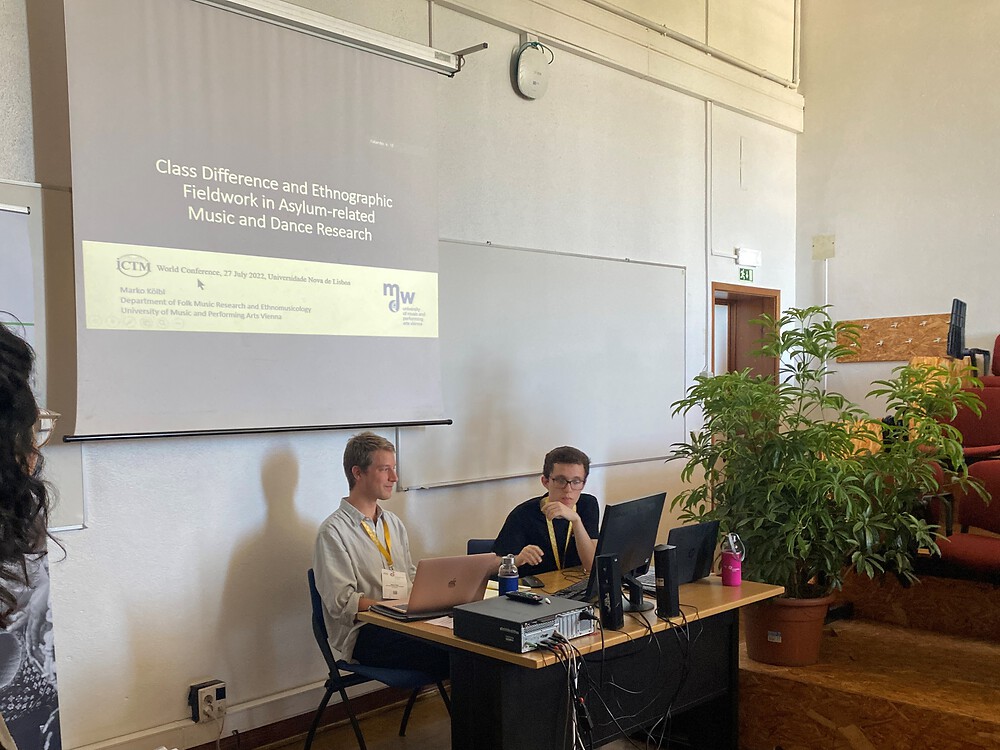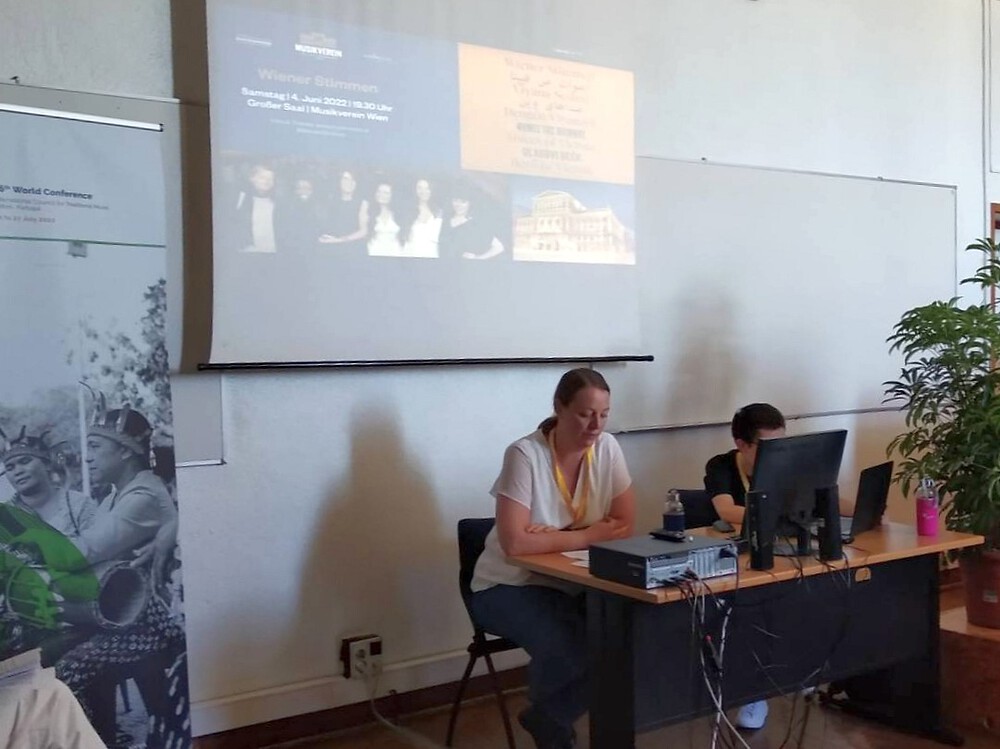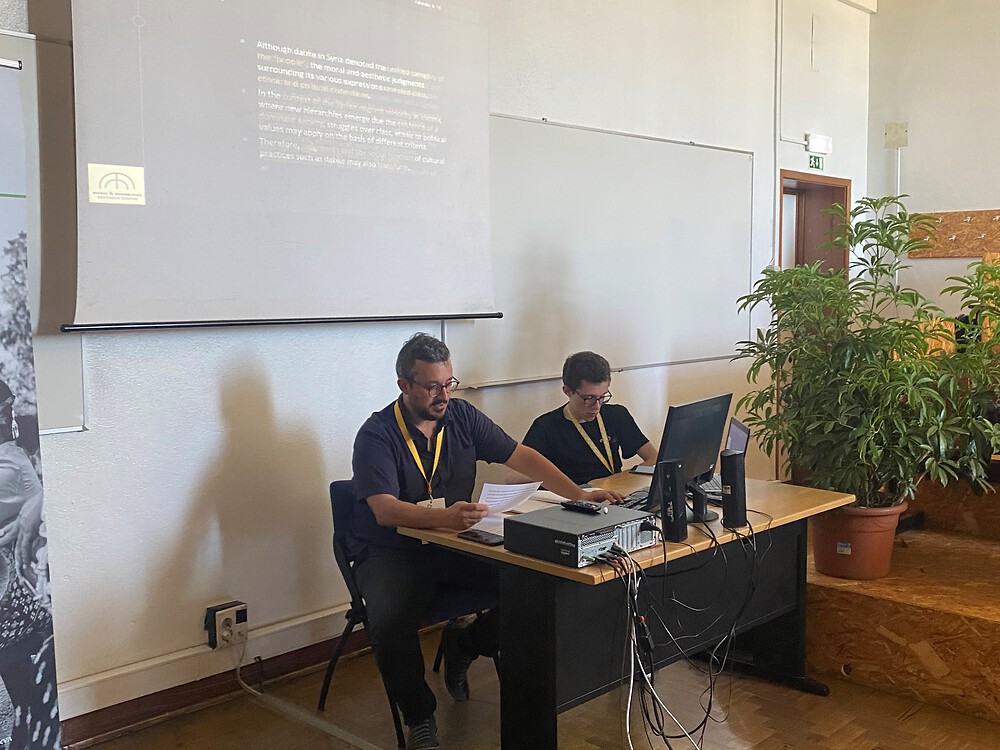Das MMRC bei der 46. ICTM World Conference in Lissabon
Die World Conferences des International Council for Traditional Music (ICTM) zählen zu den wichtigsten internationalen Veranstaltungen im Bereich der Ethnomusikologie. Bei der 46. World Conference in Lissabon (21. bis 27. Juli 2022) war das MMRC am 26. Juli mit einem eigenen Panel vertreten. Ko-moderiert von MMRC-Direktorin Ursula Hemetek und Projektmitarbeiterin Jasemin Khaleli, befassten sich die vier Vorträge von Marko Kölbl, Anja Brunner, Ioannis Christidis und Jasemin Khaleli anhand verschiedener Fallstudien aus Wien mit der Kategorie „Klasse“ im Kontext der ethnomusikologischen Minderheitenforschung (Abstracts siehe unten).
Zur großen Freude des MMRC wurde im Rahmen der Konferenz außerdem ein Beitrag aus unserem Journal Music & Minorities mit dem ICTM Article Prize 2022 ausgezeichnet. Wir gratulieren unserer Autorin Evrim Hikmet Öğüt zu diesem großartigen Erfolg! Ihr preisgekrönter Artikel „The Short History of Syrian Street Music in Istanbul: Challenges and Potentials“ kann hier gelesen werden.
Minority Studies and the Category of Class: Insights from Vienna
26. Juli 2022, 14:30–16:30, Panel im Rahmen der 46. ICTM World Conference in Lissabon
Co-Chairs: Ursula Hemetek & Jasemin Khaleli
Marko Kölbl (mdw – Universität für Musik und darstellende Kunst Wien, Institut für Volksmusikforschung und Ethnomusikologie), Class Difference and Ethnographic Fieldwork in Asylum-related Music and Dance Research
This paper addresses class difference in ethnographic fieldwork on music and dance of refugee communities, drawing on field experiences with Afghan refugees in Vienna. In ethnomusicological minority studies – particularly in research on music and migration – participatory, dialogical and decolonizing approaches to fieldwork rarely articulate class explicitly. Rather, they emphasize political inequalities and focus on a critical re-evaluation of the perceived “cultural difference” between ethnographers and their field partners. Recent methodological tendencies in migration-related field research read migrants as agents of knowledge production, as ethnographic acteurs, with class again seeming to be always apparent, but being rarely articulated and discussed. The paper argues that the category of class is a key determinant in shaping relationships between researchers and field partners, especially in asylum-related settings. I critically examine the “classed” ethnographer and argue that most researchers’ privileged class positions are neatly tied to institutionalized and handed-down modes of academic habitus. As an exceptionally class-conscious space, academia not only excludes people based on their class position, but also sets standards of formal communication, language use, and appearance that often assume class. Given how ethnographers adapt to codes in the field while relating to the refugee experience, I offer a closer questioning of how modes of “adapting” rely on the use of classed codes – the “giving- up” and “taking up” of behaviour, looks, language, etc. The paper draws on original research with the Afghan community in Vienna – a group whose discursive racialisation runs along narratives of class position, inextricably linked to other intersectional categories like age, education, gender and sexuality. Class indeed seems to be the very essence of what media and political discourse commonly frame as refugees’ “cultural difference”. The paper is based on my own ethnographic experience and seeks to present ways of countering class-based exclusions and classism in asylum-related fieldwork.
Anja Brunner (mdw – Universität für Musik und darstellende Kunst Wien, MMRC), Syrian Musicians in Vienna: The Complexity of Class in Urban Musical Life
Some years after the “long summer of migration” in 2015/2016, many musicians from Syria now lead a satisfactory life in Austria as their new country of residence and have restarted their musical activities. The musical fields that Syrian musicians are active in Vienna range from world music, jazz, rock, pop and Western classical music to Arab/Syrian classical and folk music. Looking into the biography of selected Syrian musicians since arriving in Vienna, the issue of class affiliations pops up virtually everywhere, in intersection with ethnicity, nationality, and gender. On the one hand, many Syrian musicians in Vienna come from (upper-)middle class social groups in Syria. This class background has helped these musicians in their arrival and taking ground in Vienna as musicians. On the other hand, these Viennese musicians lost their class status immediately after arrival, when they became “refugees”. This influenced their strategies in building a (musical) life in Austria on different levels. Looking closer, however, it is not only obvious that the former “class” status in Syria is more multifaceted than it seems at first sight. Also, the building of a new class status is a complex matter, revolving around musical choices, genres, networks and locations. In my presentation, I discuss the conflicting and seemingly contradictory issues that a focus on class forces us to reflect on when studying Syrian music practices in urban spaces in Europe and show how musicians deal with the (self-) categorization of class in music and life after migration.
Ioannis Christidis (mdw – Universität für Musik und darstellende Kunst Wien, MMRC), Syrian Dabke in Vienna – Examining the Relationship between Popular Music and Social Class among Syrian Migrants in Vienna
As of the 1990s, a new style of Syrian dabke music emerged, diverging from its past nationalist-folk attitude. It constitutes a developing musical idiom that combines singing, lively beats, and the playing of folk instruments in an electro-digital way. This new pop-folk dabke is connected to the working and rural classes of Syria, mainly performed by popular musicians in weddings and other festivals, and danced in circle or line. It is also common – with regional diversification and names – in areas with a strong presence of Kurdish and Assyrian minorities. This new dabke, however, especially in urban contexts, such as Damascus and Aleppo, also bears social, ethnic, and class stigma, often cited among Syrians as the “music of the streets,” “music for simple entertainment,” “the music of the mini-bus drivers of Damascus,” “not music at all.” In the past 15-20 years, because of the growing popularity of the Syrian wedding-singer Omar Souleyman, Syrian dabke started to attract the attention of audiences of alternative, world, or electronic music, in Europe and North America. At the same time, dabke traveled together with the Syrians who fled the war in their country and arrived as refugees in various Western countries. In Greece, Belgium, Germany, Austria, and the Netherlands, numerous dabke performances by Syrian migrants are today staged in public venues or private dance clubs, and very often within dance workshops. This paper particularly focuses on the presence of Syrian dabke in Vienna, Austria. Through field research, it seeks to find out where it is possible to attend dabke performances, and how Syrian dabke as a genre is positioned in the broader musical scenes of Vienna, taking into account its entrenched – negative – connotations but also its renewed momentum on a European level.
Jasemin Khaleli (mdw – Universität für Musik und darstellende Kunst Wien, MMRC), Sounding Out a Classed Field: Municipal Housing in Vienna
In the global discourse on affordable living and the real estate market, municipal housing in Vienna is gaining new significance in research and cultural work. However, it has also been a field imbued with ideological projections, desires, or anxieties by various political parties. In the revival of the historical myth as a socio-political utopia of so-called Red Vienna and the simultaneous culturalization of conflicts and precarious living, municipal housing describes a sensitive field where questions of urban coexistence are negotiated. Varying in architecture, location, and rent levels, and by no means marginal in numerical terms (one in four city residents’ lives in such housing complexes), the Gemeindebau reveals its marginalized position due to its stereotype-loaded public image and its underprivileged access to resources. This paper draws on the insights gained through fieldwork in the context of municipal housing in Vienna and examines musical activities along the lines of class and classism. In doing so, the Anton-Figl-Hof, a medium-sized complex from the late 1950s, serves as a starting point for determining the musical field. While debates around migration and integration continue to dominate tenants’ perceptions and research literature, “class” seems to be less fashionable. This project approaches municipal housing as a classed field of study and intends to apply its results onsite. How does the intersection of class with ethnicity, age or gender resonate in the domain of individual taste and music consumption in everyday life? Why does class matter in the ways music and sound are dealt with and spoken about? How does class affect interpersonal relationships between residents – and not least, between research partners and the socially positioned ethnographer herself?



